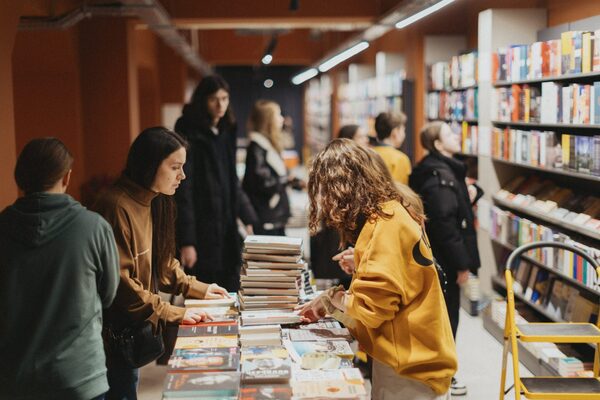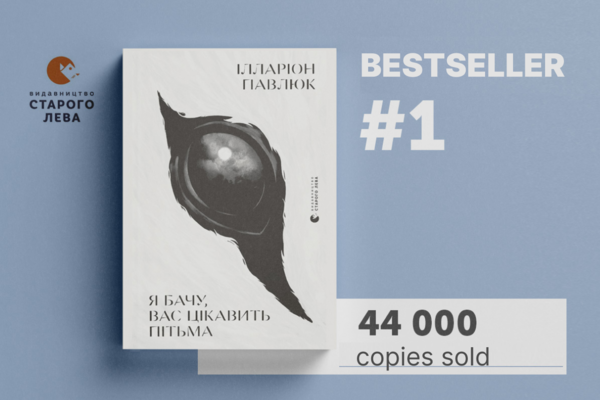The past few years have presented significant challenges for examining reading habits in Ukraine. Nevertheless, the war has profoundly impacted Ukrainian readers and the global perception of Ukrainian literature. Recent studies offer valuable insights into current reading trends in Ukraine, including the effects of the Russian book import ban and the surge in new bookstores, which have doubled in number.
The war had changed readers: +280 bookstores, –700 libraries and double increase in daily reading

Photo by Dmytro Larin, courtesy of Chytomo Editorial
The latest research conducted by the Ukrainian Book Institute and NGO Bookforum shows a significant growth in reading. Surveys reveal a notable increase in regular readers, with 17% reading daily (double-fold increase comparing to 2020) and 19% reading several times a week, totaling 36% of regular readers. This figure had remained steady at 27% over the past six years.
Among the factors contributing to this trend, the study named the “increased free time due to unemployment” or “power outages”, as well as “therapeutic effect of reading”. Reading is seen as a safe and accessible activity that can be done in shelters, making it an attractive option during challenging times.
Responding to the growing interest in reading, new bookstores are appearing at an incredible rate, like a burst of new life. In 2018, Ukraine had 222 registered bookstores. Recently, the Ukrainian Book Institute announced the opening of the 500th bookstore in Ukraine. While most of these new stores have been established in major cities, they’re now also emerge even in small villages.
(See here the online map of the Ukrainian bookstores).
“Bookstores expand the market rather than simply redistributing it, attracting new readers,” says Viktor Kruhlov, head of one of the biggest Ukrainian publishing houses Ranok Corporation.
At the same time, Ukraine’s demographic situation has changed, with many people having left the country, and the population is now estimated to be around 35 million (down from 41 million before the Russian full-scale invasion). As a result, publishers and bookstores are visibly competing for readers’ attention.
However, growing attraction to bookstores as physical spaces doesn’t bring significant financial changes in the market’s volume: spending on book purchases remains modest, with 44% spending 6.5-22 EUR during the last three months, 28% spending up to 6.5 EUR, and 21% spending over 22 EUR. Despite low purchasing power, there has been a more systematic approach by the state and media to encourage book purchases, particularly for gifting: 7% of respondents receiving books as gifts in the past year. This year president Zelenskyy continued this “book gift policy” by signing the law that provides book certificates for 18 years old citizens.
While the new bookstores are opening all over the country, the survey notes a decline in library popularity, from 15% in 2018 to 7% in 2023, due to nearly nonexistent funds for replenishing library collections and the destruction or damage of around 500 libraries since the full-scale Russian invasion (in 2024 Ukraine reported about 700 libraries).
The other interesting detail: Ukrainian language is gaining strength, with a record number of people choosing to read in Ukrainian, surpassing all previous records in the last decade. According to a recent survey, 54% of respondents aged 16 to 59 now prefer reading in Ukrainian, marking a significant increase from 24% in 2018 and 32% in previous years. Conversely, the proportion of those who choose Russian for reading has dropped from 28% to 10%.

Photo by Dmytro Larin, courtesy of Chytomo Editorial
What are Ukrainians reading?
Children’s literature? Not really. A notable trend has emerged in the publishing industry, with children’s publishing houses experiencing a significant shift in their target audience. Previously focused solely on producing content for kids, these publishing houses have now expanded their catalogs to cater to a wider range of readers, encompassing both fiction and nonfiction for a broader audience.
Fiction + nonfiction literature. Since there is currently no specialized data provider focused exclusively on tracking book sales, in 2023 Chytomo Media has taken the initiative to conduct its annual monitoring of book sales in Ukraine. Data collected from 35 leading publishers reveals that Ukrainian writers have claimed the leading positions.
The top-selling book of 2023 in Ukraine was “I Can See You’re Interested in the Darkness” by Illarion Pavliuk, reaching a remarkable 44,000 copies sold. In 2024 the publisher reported on 100,000 copies sold in total. This psychological thriller, spanning over 600 pages, explores the depths of human indifference and darkness.
“The Colony. New Dark Ages” – the first book of a science fiction trilogy by Maksym Kidruk, is following closely with 37,000 copies sold. Both books took top two positions among the bestsellers at the audio version too.
The list of bestselling titles that follows include: “Taming Tigers: Do Things You Never Thought You Could” by Jim Lawless (35,000 copies sold), “Man’s Search for Meaning by Viktor E. Frankl (30,000), “Dance with Bones: A Medical Thriller” by Andriy Semyankiv (27,603); “There Is Land Beyond Perekop” by Anastasiya Levkova (26,000).

Historical literature. Since Russia’s full-scale invasion of Ukraine began, major bookstore chains have seen interest surge for Ukrainian historical nonfiction literature. This trend has been observed at Yakaboo, Ukraine’s largest online bookstore, as well as at Bookstore Ye (Knyharnia Ye), Knyholand, and the Family Leisure Club (Klub Simeynoho Dozvillia). Serhii Plokhy, Yaroslav Hrytsak, and Volodymyr Viatrovych lead the bestsellers list. Among the top 10 bestsellers, only one was penned by a non-Ukrainian writer.
Yevhen Volovichenko, director of Yakaboo, reported a 24% increase in sales of history publications compared to 2020-2021. Reader interest peaked in 2022 and again in February 2023, marking the first anniversary of the Russia-Ukraine war’s new phase.
At Bookstore Ye, sales of historical literature surged tenfold over the past two years, while Family Leisure Club reported visible growth, including a doubling of sales of historian Serhii Plokhy’s book “The Gates of Europe” in 2023 compared to 2022.
The list of the most popular books include: “The Gates of Europe: A History of Ukraine” by Serhii Plokhy (reported as a bestseller in three major bookchains), “A Brief History of Ukraine: The Forging of a Nation” by Yaroslav Hrytsak and “The Russo-Ukrainian War: Return of History” by Serhii Plokhy. Among others, the books that are not available in English: “Our Century: Brief Essays on a Long War” by Volodymyr Viatrovych, “An Outline of the History of Ukraine: The Formation of a Modern Nation in the 19th-20th Centuries” by Yaroslav Hrytsak, “Rebellion Against the Empire: Ukrainian Sixtiers” by Radomyr Mokryk (is set to be published this year in German this year), “Ukraine: A History with the Label ‘Top Secret’” by Volodymyr Viatrovych, and others.
Ukrainian classics are trending now, with almost every publishing house launching its own series of Ukrainian classics. Vikhola Publishing, previously focused on non-fiction literature, has achieved immense success with its classic series. Similarly, Vivat Publishing has introduced a beautifully curated series, and other publishers, both major and small, have followed suit. This surge in Ukrainian classics – previously forbidden in Soviet times – has led to a significant shift, replacing Russian classics and revealing distinct differences from the Soviet-inherited literature that many people had in their home libraries.
Amidst the ongoing shellings, air raids, and electricity cuts, Ukrainians are turning to books for solace and answers. They are seeking answers in history books, rediscovering Ukrainian classics, and exploring alternative realities to escape the everyday stress and anxiety. There is a growing desire to hear the unique and tragic experiences of Ukrainian authors and to discover the world’s best literature. “We are what we read,” and indeed, Ukrainians have already undergone significant changes, as has Ukrainian literature and publishing itself.

















